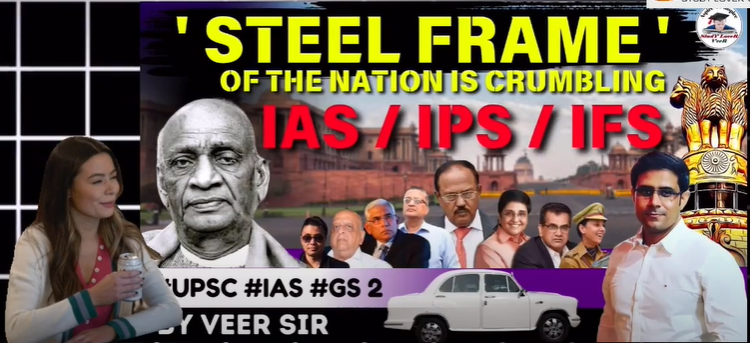Steel frame of the nation is crumbling
You’re referring to the Indian Administrative Service (IAS), which is often called the “Steel Frame of India”.
The term “Steel Frame” was coined by Sir Richard Tottenham, a British civil servant, to describe the Indian Civil Service (ICS), which was the precursor to the IAS.
The IAS is considered the backbone of India’s administrative machinery, responsible for implementing policies, managing public services, and maintaining law and order.
However, you mentioned that the “Steel Frame” is scrambling. This could refer to various challenges facing the IAS, such as:
1. Brain drain: Many IAS officers are leaving the service to join the private sector or pursue other opportunities.
2. Political interference: IAS officers often face pressure from politicians, which can affect their impartiality and effectiveness.
3. Bureaucratic delays: The IAS is often criticized for slow decision-making and implementation of policies.
4. Corruption: Like any other institution, the IAS is not immune to corruption, which can undermine its credibility and effectiveness.
These challenges can indeed cause the “Steel Frame” to scramble, affecting the overall governance and administration of the country.
Here are key points about the “Steel Frame of India” for UPSC:
Definition and Origin
1. The term “Steel Frame” refers to the Indian Civil Service (ICS), which was the precursor to the Indian Administrative Service (IAS).
2. Coined by Sir Richard Tottenham, a British civil servant.
Role and Significance
1. Backbone of Administration: IAS officers are responsible for implementing policies, managing public services, and maintaining law and order.
2. Policy Implementation: IAS officers play a crucial role in implementing policies and programs of the government. 3. District Administration: IAS officers serve as District Magistrates/Collectors, overseeing district-level administration.
Challenges Faced
1. Brain Drain: Many IAS officers leave the service to join the private sector or pursue other opportunities.
2. Political Interference: IAS officers often face pressure from politicians, affecting their impartiality and effectiveness.
3. Bureaucratic Delays: IAS is criticized for slow decision-making and implementation of policies.
4. Corruption: Like any institution, IAS is not immune to corruption, undermining credibility and effectiveness.
Relevance for UPSC
1. Polity and Governance: Understanding the role and significance of IAS is crucial for UPSC aspirants.
2. General Studies: IAS-related topics are often covered in General Studies papers.
3. Essay Writing: IAS-related topics can be covered in essay writing, such as the role of IAS in Indian governance.

Sources- Study Lover Veer
Previous Article- Click Here
